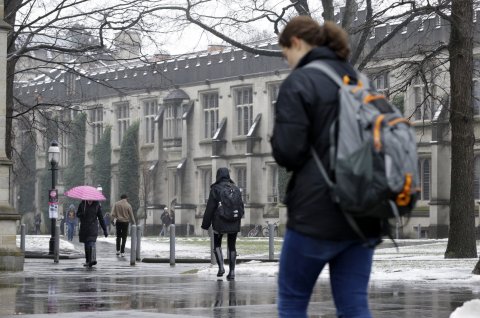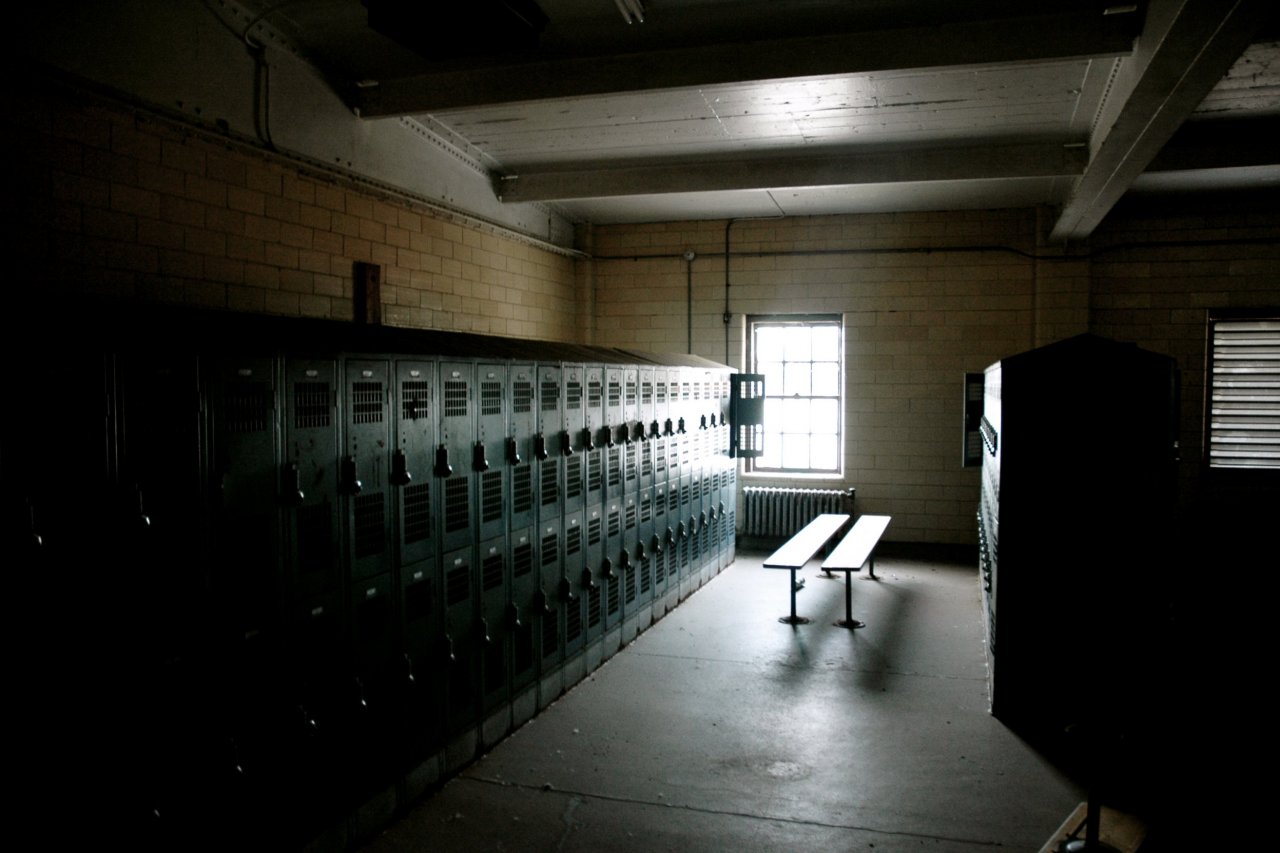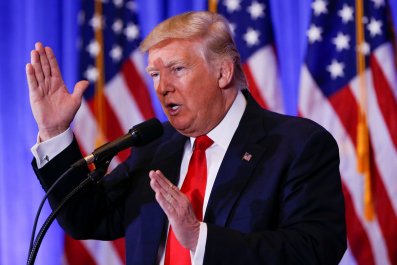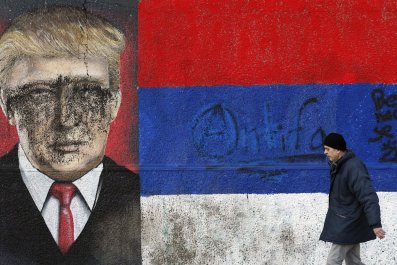At Amherst College, a member of the men's cross-country team referred to a woman online as "a walking STD." At Columbia, a student on the men's wrestling team wrote to his teammates, "I hope someone actually gets sexually assaulted," after the university canceled an event because of concerns about sexual misconduct. Meanwhile, at Harvard, men's soccer players circulated a list of female soccer recruits, ranking them based on their appearance, among other things.
Since November, these top institutions and one more have suspended male athletes or entire teams from competing because of lewd comments on private messaging apps. A fifth school investigated similar allegations, and a resolution is pending. In most of the cases, student publications revealed the details from the private messages or documents, prompting school officials to launch probes and suspend the players from competing.
Related: Internet Shaming Could Change How Colleges Handle Sexual Assault
In recent years, colleges and universities have focused largely on sexual assault complaints, but these latest athletic punishments suggest schools are also taking sexually offensive language more seriously. This comes at a time when the U.S. Department of Education could shift priorities under President Donald Trump, who has dismissed his own lewd comments as "locker room talk." In 2011, the Education Department issued guidance for how schools should handle sexual misconduct, which the 2016 Republican Party platform said "must be halted" because it interferes with law enforcement and threatens due process rights for the accused. In her Senate confirmation hearing, Betsy DeVos, Trump's pick to run the Education Department, condemned sexual assault but refused to say that she would uphold that guidance.
Some have applauded how the five schools handled the incidents and said the punishments could even go further. Sally Jenkins, a sports columnist for The Washington Post, described the Columbia wrestlers as "young swine who parade their rapey, racist sentiments in group chats" and said they "gave up their claim to privacy when they threw out their chests [emblazoned] with the word 'Columbia.'" The Boston Globe's Kevin Paul Dupont wrote that the administrators should name the men involved publicly and "toss them out of school."
But free speech advocates say schools shouldn't police private messages, even if athletic codes of conduct hold team members to higher standards than general student codes do. "Universities, even public universities, do have greater leeway to regulate the conduct of their athletes," says Samantha Harris, vice president of policy research at the Foundation for Individual Rights in Education (FIRE), a nonprofit that defends rights on college campuses. "But I think that when they start delving into students' private or small-group communications, they're really betraying their mission as free institutions and, as I've said, sort of acting as a totalitarian state."
'Fuck Those Feminist Bitches'
The fallout began at Harvard. In October, The Harvard Crimson leaked details from an online document that a men's soccer player wrote and circulated among his teammates in July 2012. The nine-page "scouting report" contained photographs of female soccer recruits and assessed them based on looks, gave them nicknames and speculated about their favorite sexual positions. "She seems to be very strong, tall and manly so I gave her a three," the author wrote about one recruit. He referred to another as "Gumbi" because of "her gum to tooth ratio."
Members of Harvard's 2012 women's soccer team responded in an op-ed in the Crimson, saying the list and the furor that ensued made them feel "embarrassment, disgust and pain." When the school learned that the men's team had written similar documents as recently as 2016, it canceled the rest of their season. The men's team apologized in early November, writing in a statement that "no woman deserves to be treated in this manner."
Days after that apology, the Crimson reported that the men's cross-country team had written similar comments in online spreadsheets about their female counterparts, some of them "sexually explicit." Those dated as far back as 2012. After an investigation, the school placed the team on athletic probation but didn't cancel its season. University President Drew Faust told the Crimson that it was possible that these sorts of documents were a tradition on multiple teams on campus.
Similar events began unfolding at Columbia that same month, when an online student publication, Bwog, published screen shots of messages that members of the men's wrestling team had exchanged on a group messaging app. One mentioned a girl who "gives head to everyone," prompting another person to respond, "Can I get her number?" And when someone wrote that they all should have attended state schools, others responded, "Dude no lie we would run the town of any state school fuck those feminist bitches" and "Columbia bitches feel entitled to something when in reality they are all ugly socially awkward cunts." Other exchanges included homophobic and racial slurs.

In a statement to Bwog, the university said the comments were "appalling." Students protested outside of a fraternity house where some of the wrestling team members lived, holding a sign that said, "White supremacy lives here." A petition calling for the school to expel the wrestlers garnered more than 1,100 signatures. The team later apologized in an open letter, writing, "This has been a wake-up call."
After investigating, Columbia suspended some of the wrestlers from the team for the rest of the academic year and others until the spring semester. "We recognize that free speech is a core value both of the university community and of our nation," the school said. "However, the group text messages that have been brought to light do not meet the standard of behavior we expect from our student-athletes."
A month later, more colleges handed out punishments for similar offenses. On December 11, Amherst suspended its men's cross-country team after The Indicator, a student outlet, published a report about offensive emails team members exchanged between 2013 and 2015. One contained photographs of eight women and sexual and sexist remarks. Following an investigation, school officials placed the team on probation until fall 2018. Certain members would be prohibited from competing and would need to "discuss options for redressing the harm to the individuals and groups targeted."
Then, on December 15, Princeton said it had suspended its men's swimming and diving team because of a complaint about "vulgar and offensive, as well as misogynistic and racist," written content. A week later, it canceled the rest of the team's season. On December 16, Washington University in St. Louis said it had suspended its men's soccer team after the women's team accused the men of writing "degrading and sexually explicit comments" about them in an online document, according to a school statement. The investigation has since ended, and a resolution is pending.
The timing was bad for all three schools: That week, they had sent out their first rounds of acceptance letters.
Boys Will Be Rapists
A culture of misogyny in college athletics has long gone unchallenged, according to critics. "Women were looked at, certainly in the sports world, as second-class citizens," says B. David Ridpath, an associate professor of sports administration at Ohio University. "We've also given our male athletes a tremendous sense of power, a tremendous sense of control and probably an even larger sense of entitlement."
Previously, when it came to investigating male college athletes for wrongdoing, Ridpath says, "it was almost like omertà," a code of silence. "If an athlete was accused of doing anything," he adds, "a huge mechanism would be thrown into place to protect that athlete." At Baylor, for example, an investigation that concluded in 2016 found that the athletics department and football program failed "to identify and respond to a pattern of sexual violence by a football player and to a report of dating violence." But comments in writing are harder to ignore or deny, and social media have brought national attention to incidents that, until a few years ago, might have barely made the campus newspaper.
Rating women on their looks or calling one "Gumbi" is not the same as sexual violence, but those attitudes can lead to it, according to a study published last May in the journal Violence Against Women. The researchers found that male college athletes tend to be more dismissive of situations that could be considered rape or sexual assault than nonathletes, and that these same athletes admitted to having pressured or forced others into unwanted sexual activity more than nonathletes—suggesting that attitudes are a risk factor for committing sexual violence.
"Athletes are segregated in their own dorm rooms, they eat together, they practice together, travel together, they're tutored together," says Belinda-Rose Young, the study's lead author, who conducted it as a researcher at the University of South Florida. "When you're immersed in such a culture, an environment, over time, it can have an effect on your attitudes and your beliefs."
Katherine Redmond Brown says she has experienced the dangers of locker room talk firsthand. In the 1990s, she filed a Title IX lawsuit against the University of Nebraska over its handling of her sexual assault complaint against a football player at the school. (Title IX is the federal law that prohibits sex discrimination in federally funded education programs.) "When I was at Nebraska, I had learned of the locker room talk about me," she says. "[That] led to me having to fend off more aggressive behaviors by those same people in that locker room."
Brown and the university settled the lawsuit, and she went on to start the National Coalition Against Violent Athletes, a victims' advocacy and prevention organization. Some two decades later, she hopes the recent sanctions mean schools are starting to take that sort of behavior more seriously. "Before, it was just seen as 'Oh, that's part of the culture. Boys will be boys,'" she says. "What these schools are [now] doing is saying that language and these actions are a precursor to something greater."
Free speech advocates, however, aren't convinced offensive language leads to physical violence, and they worry that sanctions like these set a dangerous precedent. "Each time that a university does crack down on student speech," says FIRE's Harris, it "paves the way for other schools to do it." While the First Amendment, which protects speech, does not necessarily apply to private institutions, Harris points out that the student codes at those schools claim to protect it. Columbia's regulations, for example, say the school "does not limit discussion because the ideas expressed might be thought offensive, immoral, disrespectful or even dangerous." (The family of Education Department nominee DeVos has a foundation that has donated at least $25,000 to FIRE. The organization is sponsoring a pending lawsuit against the department over its sexual assault guidance.)
Private messages not intended to be seen by the people they are about would likely not constitute harassment or incitement, according to Harris, and schools can educate athletes on the topic without censoring or punishing them. Even though "a lot of protected speech is deeply unsympathetic," she says, "I don't think institutions that claim to value free speech have carte blanche to take action against student athletes for what those students believed to be private communications."
Otherwise, she adds, "you have a hopeless slippery slope."
An earlier version of this article was published online on December 20. The version published here reflects the one in Newsweek's February 3 print edition.















